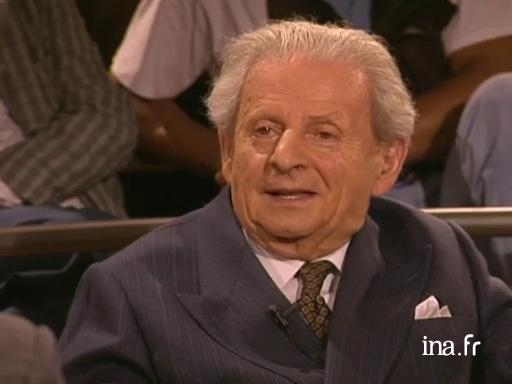Michel Field
Good evening, Emmanuel Levinas.
"God, Death, Time", these are texts from classes that you gave during the 1975-1976 school year, so I'm going to introduce you.
You are probably one of the most important philosophers of French thought, but at the same time, many people do not know you, because you don't, how shall I say it, you don't get a lot of media coverage, as we now say.
Emmanuel Lévinas
That's true, I don't know my readers at all.
There are probably some that have been following me without manifesting themselves, or else they manifest themselves intimately, not in public today - perhaps a bit like I have the occasion to, maybe the luck or the misfortune to, rather.
Michel Field
And what do you think, exactly, about this sort of noise, of racket, of publicity, which is now supposed to surround the release of a book, when you compare it with a solitary and rigourous mental exercise?
Emmanuel Lévinas
I obviously don't trust this dragging of general ideas or of intimate ideas into public discussions without preparation, without having a previous contact with the texts,
and for me, teaching things verbally always presupposes digging deeper into written texts, where physical gestures are as important as written gestures.
Michel Field
Well, I'm going to introduce you quickly.
You were born in Lithuania in 1906, you first exiled yourself in Russia, then in France, in Strasbourg, where you started studying philosophy at the same time that you were building a friendship with Maurice Blanchot.
You went to Freiburg in 1928 to study under Husserl and Heidegger, and then, obviously, there was the war, the camps, the rise of Nazism, and we can say that this tragedy of history is inscribed at the core of your thoughts.
It seems, well, you'll let me know if it's a good summary or description, that your thinking intersects with areas that are usually kept quite separate from each other, and you've tirelessly tried to build a dialogue between traditions that were oblivious
I'm especially referring to the tradition of Western philosophy and of Hebrew philosophy, but also Russian literature which was very important to you, and German phenomenology...
Is this intersection situation, was it a choice or is it rather a consequence of this century's history?
Emmanuel Lévinas
It wasn't a choice, in the sense that it's not about going through them and asking ourselves each time, what do I need to remember, right?
An authentic way of thinking, sincere thought requires texts, the great texts especially, those few great texts that are more in agreement with each other than we think, but freedom and calling upon different authors is certainly useful, but it's not at a
It's about thinking that attaches itself to an excellent expression, an expression, a great expression, and that might be the source of a sort of extension and a genuine discussion.
Michel Field
We can say that you are the leading thinker with regards to the Other person, with regards to Others, and you have always tried to think about what really constitutes the relationship with the Other person.
Emmanuel Lévinas
Right there, you happened to mention one of my favourite themes, not at all because it's a theme that leads to great developments, but because it seems to be at the core of what is human.
The essence of a human.
And if you [misunderstood] at the level of this reflection, there has always been the search for what is genuinely human and what is the, if you will, the relationship with the other man.
The relationship with the other man seemed to me to be the definition, the main feature, the great mystery of humanity, if you will, and even of man.
Michel Field
So then...
Emmanuel Lévinas
Before we dive into this theme, such as the theme of community, as if you wanted an extension of knowledge by processing a considerable amount of data,
I've always been looking for - and I still think that's it's very important to find them - a genuine dialogue between people and a real conversation between - closely observed with regards to quotes and the adoption of definitive formulas - but the essent
The formula that I'd like to cite is that what we call transcendence, the exit from oneself, the exit from oneself, is the human, and this exit from oneself is always the relationship we have with another man.
Michel Field
So then...

























